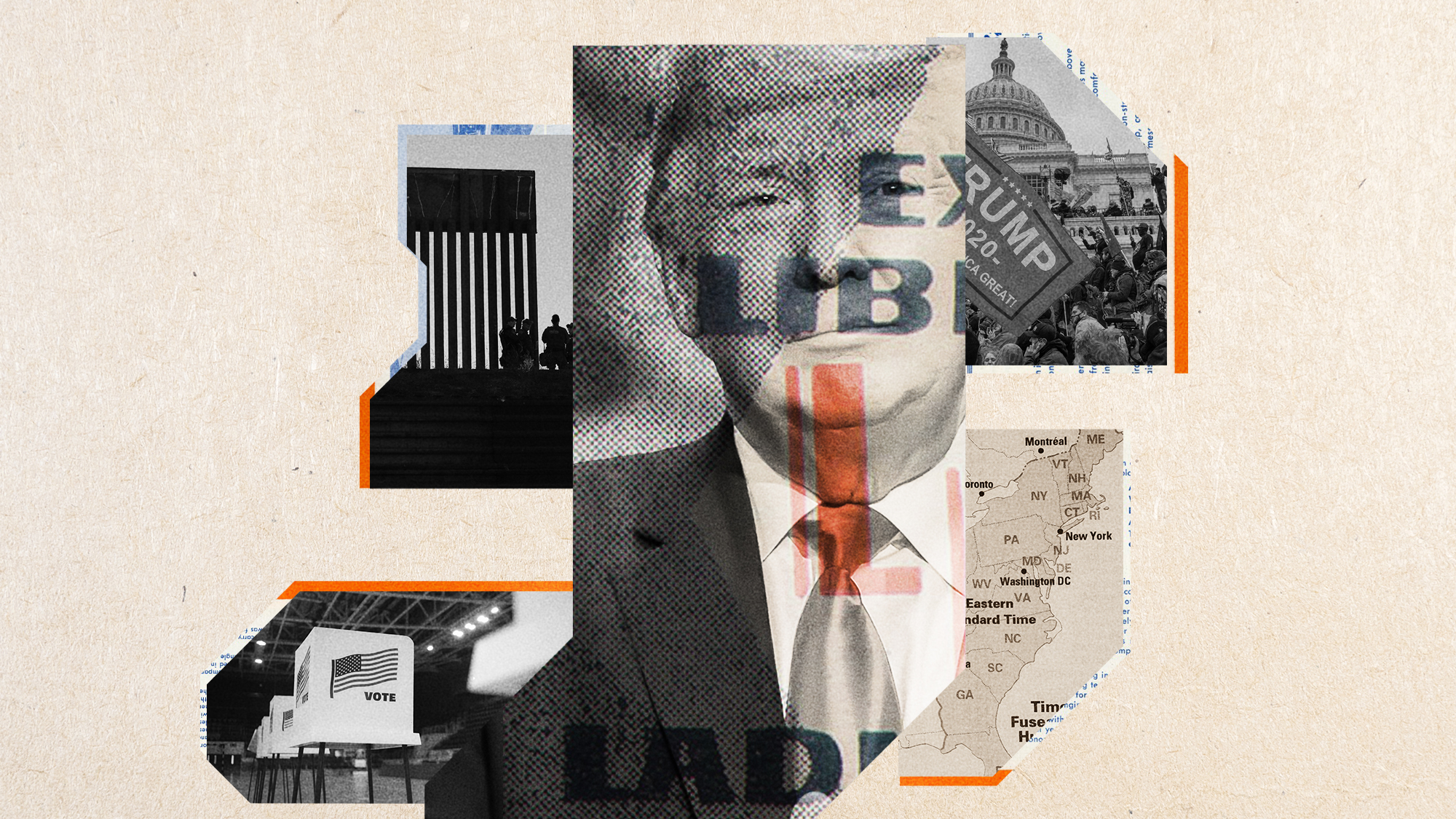In May 2024, Donald Trump made history as the first convicted felon to be nominated by a major political party for the office of President of the United States. He was found guilty on thirty-four counts of falsifying business records. Like much else about Trump’s political career, this situation is unprecedented. However, the issues raised go beyond his criminality. To truly gauge the dangers posed by his candidacy, we must recognize him for what he has become: a fascist leader determined to dismantle what remains of America’s imperfect democracy.
In his book, The Anatomy of Fascism, Robert Paxton presents nine ‘mobilizing passions’ of fascism. Rather than concrete ideologies, these are emotional drivers that the movement uses to provoke support. They are summarized here as follows:
- A sense of overwhelming crisis that necessitates radically new solutions;
- The primacy of an in-group group, and the subordination of individuals to it;
- The depiction of the in-group as a victim, thereby justifying any action to protect its interests;
- Fear of the group’s decline as a result of enemy action;
- The need for closer integration of the in-group by any means necessary;
- The need for absolute authority by the in-group’s leader, who alone is capable of defending the group’s historical destiny;
- The superiority of the leader’s instincts over logic, evidence, or reason;
- The beauty of violence and of will, in pursuit of the group’s success;
- The right of the in-group to dominate others without any kind of restraint, legal or otherwise.
Fascist movements are usually helmed by a leader who is said to intuitively understand the will of the people and their historical destiny. Often charismatic and adhering to the “cult of personality,” these leaders habitually position themselves as champions of the common people, fighting against a corrupt elite. They promise to do away with this elite and unite the nation in a crusade against perceived enemies and behind a vision of national renewal. This approach requires creating a narrative of chaos and arousing fear of the present and hatred towards outsiders. Trump’s role in American politics over recent years certainly bears striking similarities to these tactics.
In determining whether Trump has crossed the line into fascism, it is difficult to overstate the importance of the attempted insurrection on January 6, 2021. Never before had a defeated US presidential candidate encouraged such violence or refused to participate in a peaceful transfer of power. These actions – rejecting legitimate election results and inciting violence against political opponents – are classic ingredients of fascism. Trumpism has now adopted a stance of only accepting election results that are in its favor. During the debate with President Joe Biden in late June, Trump had to be asked three times before answering whether he would accept the election results – and even then he was evasive. Looking ahead, this troubling pattern appears to be intensifying rather than abating.
A Trump second term, if it comes to pass, is poised to be more autocratic than the first. Several concerning plans are already afoot. There are efforts to bring agencies such as the Federal Communications Commission, which regulates television and internet companies, under direct presidential control. Career civil servants would lose employment protections, opening the way for the dismissal of those deemed insufficiently loyal to Trump – the man – particularly those individuals working in intelligence agencies, the State Department, and defense bureaucracies. The Economist reports that expressing any doubts about what happened on January 6th will be grounds for dismissal. Culture wars would intensify. Just look at the national commission Trump announced in 2020 to promote a “patriotic” school curriculum that would, among other things, eliminate educating students about systematic racism.
There is much more. For example, Arizona Senator Anthony Kern has proposed a bill that declares that the “state legislature, and no other official, shall appoint presidential electors” and effectively have the power to overturn the results of presidential elections. The Brennan Center for Justice reported in 2020 that over 425 bills had been passed aiming to restrict voting in 49 states. These include placing limits on mail-in voting, tougher voter ID laws, and the purging of voter rolls. Black voters, long subject to voting restrictions and suspected of being more likely to vote Democrat, are especially susceptible.
The implications for future transitions of power, should Trump win a second term, are concerning. Heather Cox Robinson is unequivocal: “The signs are all there that he would not leave voluntarily. After all, he did his best to stay in office in 2021, sparking an insurrection to do it, and he has vowed to use the power of the presidency more forcefully in a possible second term.” Moreover, this danger goes beyond Trump. Even if he himself is no longer in the picture, those who have aligned themselves with his image and ideology would likely continue down the path he forged.
The trajectory could lead America towards what experts call an “anocracy” – a state that is neither fully democratic nor fully authoritarian, but somewhere between the two. Such political environments are often breeding grounds for civil unrest. As the Republican party moves ever more to the right, some members are openly advocating a civil war. People such as Steve Bannon, a former key aide to Trump, have been more than willing to exploit this mood. Consider his words during a speech to thousands of MAGA activists in December 2022: “‘Are we at war?’ he demanded to know at the outset…’Are you prepared to take this to its ultimate conclusion and destroy the Deep State?’ he demanded… ‘You are an awakened army!’ he bellowed.”
Trumpist narratives offer simplistic solutions to complex problems: build a wall between the US and Mexico, expel immigrants, revoke abortion rights, oppose gun control measures (ostensibly to make people safer), and fight culture wars against what they call the liberal elite. All of these efforts, they claim, will “Make America Great Again” (MAGA). Such narratives can only be countered effectively by narratives that offer better ideas.
Barbara F. Walter concludes her book How Civil Wars Start by imagining how one could be averted in the US: “the federal government should renew its commitment to providing for its most vulnerable citizens, white, black or brown. We need to undo fifty years of declining social services, invest in safety nets and human capital across racial and religious lines, and prioritise high-quality early education, universal healthcare and higher minimum wage. Right now, many working-class and middle-class Americans live their lives ‘one small step from catastrophe,’ and that makes them ready recruits for militants. Investing in real political reform and economic security would make it much harder for white nationalists to gain sympathizers and would prevent the rise of a new generation of far-right extremists.”
A reimagining of society along these lines is long overdue and is a necessary antidote to Trumpism. However, advocating for a more activist state is challenging, particularly in America, and is certainly not a panacea. The 20th century is full of examples showing that centrally planned economies that displace market forces are incompatible with democracy. Just look at the former Soviet Union and those Eastern Bloc countries modeled after it, North Korea, and Cuba. State intervention must be judged by the extent to which it solves more problems than it creates – and it must be held democratically in check. This is a difficult but necessary debate.
Fixing Democracy Before It Goes Bust
In parallel with economic renewal, addressing the deficits of American democracy is crucial. A key issue is the Electoral College, consisting of 538 electors nominated from each state. A presidential candidate requires 270 votes to win. However, the system was originally designed to favor small states and slave states, creating a possibility for a candidate to lose the popular vote yet win the presidency. This is precisely what happened in 2016, when Hillary Clinton won the popular vote by more than two percent with 65,853,514 votes against Trump’s 62,984,828, yet Trump secured the presidency with 306 Electoral College votes to Clinton’s 232. In 2020, Biden’s popular vote margin was even bigger – more than seven million votes – but it’s important to note that a shift of a few thousand votes in five or six key states could have swung the Electoral College to Trump. There are many ways to describe this, but democratic isn’t one of them.
Abolishing the Electoral College, a system unique to the US, is clearly necessary. This is no easy task, of course, as those who benefit from the current system would resist such change. But the time to engage in the battle for reform is now, before Trumpism or similar movements further dismantle the country’s existing checks on power. While no democracy is perfect, it will be missed once it is gone. As the pragmatic Tancredi tells his uncle, Prince of Salina, in Giuseppe Tomasi di Lampedusa’s novel The Leopard, “If we want things to stay as they are, things will have to change.”
Humanity currently faces multiple challenges, with climate change standing out as an existential threat. In this context, global cooperation is more vital than ever. Purely national responses, such as building a wall between the US and Mexico, can’t keep the climate at bay, nor will it manage the millions of climate refugees expected in the coming decades. The path forward requires leaders and citizens to commit to a more inclusive and cooperative future, to fight back against racism and poverty, and recommit to democratic forms of government. The struggle against Trumpism and for a secure and stable future is fundamentally a battle of ideas – one that society cannot afford to lose.
© IE Insights.











